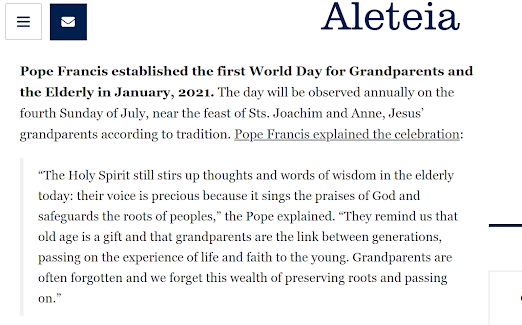Into whatever city or town you shall enter, said the Man-God to His disciples, inquire who in it is worthy, and there abide (St. Matt. x. II). Now St. Luke relates that as they went, our Lord Himself entered into a certain town, and a certain woman named Martha received him into her house (St. Luke x. 38). How could we give greater praise to Magdalene's sister than by bringing together these two texts of the holy Gospel?
This certain town, where she was found worthy to give Jesus a lodging, this village, says St. Bernard (Bern. Sermo 2 in Assumpt. Beatae Mariae Virginis), is our lowly earth, hidden like an obscure borough in the immensity of our Lord's possessions. The Son of God had come down from heaven to seek the lost sheep; He had come into the world He had made, and the world knew Him not; Israel, his own people, had not given Him so much as a stone whereon to lay His head, and had left Him in His thirst to beg water from the Samaritan. We, the Gentiles, whom he was thus seeking amid contradictions and fatigues, ought we not, like Him, to show our gratitude to her who, braving present unpopularity and future persecution, paid our debt to Him?
Glory, then, be to this daughter of Sion, of royal descent, who, faithful to the traditions of hospitality handed down from the patriarchs and early fathers, was blessed more than all of them in the exercise of this noble virtue! These ancestors of our faith, pilgrims themselves and without fixed habitation, knew more or less obscurely that the Desired of Israel and the Expectation of the nations was to appear as a wayfarer and a stranger on the earth; and they honoured the future Saviour in the person of every stranger that presented himself at their tent door; just as we, their sons, in the faith of the same promises now accomplished, honour Christ in the guest whom His goodness sends us. This relation between him that was to come and the pilgrim seeking shelter made hospitality the most honoured handmaid of divine charity. More than once did God show His approval by allowing Angels to be entertained in human form. If such heavenly visitations were an honour of which our earth was not worthy, how much greater was Martha's privilege in rendering hospitality to the Lord of Angels! If before the Coming of Christ it was a great thing to honour Him in those who prefigured Him, and if now to shelter and serve Him in His mystical members deserves an eternal reward, how much greater and more meritorious was it to receive in Person that Jesus, the very thought of whom gives to virtue its greatness and its merit. Again, as the Baptist excelled all the other Prophets by having pointed out as present the Messias whom they announced as future, so Martha, by having ministered to the Person of the Word made Flesh, ranks above all others who have ever exercised the works of mercy.
While Magdalene, then, keeps her better part at our Lord's feet, we must not think that Martha's lot is to be despised. As in one body we have many members, but all the members have not the same office (Rom. xii. 4), so each of us has a different work to perform in Christ, according to the grace we have received, whether it be to prophesy or to minister. And the Apostle explaining this diversity of vocations, says: I say, by the grace that is given me, to all that are among you, not to be more wise than it behoveth to be wise, but to be wise unto sobriety, and according as God hath divided to every one the measure of faith (Rom. xii. 3). How many losses in souls, how many shipwrecks even, might be prevented by discretion, the guardian of doctrine and the mother of virtues.
"Whoever," says St. Gregory with his usual discernment, "gives himself entirely to God, must take care not to pour himself out wholly in works, but must stretch forward also to the heights of contemplation. Nevertheless, it is here very important to notice that there is a great variety of spiritual temperaments. One who could give himself peacefully to the contemplation of God, would be crushed by works, and fall; another, who would be kept in a good life by the ordinary occupations of men, would be mortally wounded by the sword of a contemplation above his powers: either for want of love to prevent repose from becoming torpor, or for want of fear to guard him against the illusions of pride or of the senses. He who would be perfect must, therefore, first accustom himself on the plain to the practice of the virtues, in order to ascend more securely to the heights, leaving behind every impulse of the senses which can only distract the mind from its purpose, every image whose outline cannot adapt itself to the figureless light he desires to behold. Action first then, contemplation last. The Gospel praises Mary, but does not blame Martha, because the merit of the active life is great, though that of contemplation is greater (Moral. in Job v. 26, passim.)"
If we would penetrate more deeply into the mystery of the two sisters, let us notice that, though the preference is given to Mary, nevertheless it is not in her house, nor in that of their brother Lazarus', but in Martha's house, that the Man-God takes up his abode with those he loves. Jesus, says St. John, loved Martha, and her sister Mary, and Lazarus (St. John xi. 5). Lazarus, a figure of the penitents whom his all-powerful mercy daily calls from the death of sin to divine life; Mary, giving herself up even in this life to the occupation of the next; and Martha, who is here mentioned first as being the eldest, as first in order of time mystically, according to what St. Gregory says, and also as being the one upon whom the other two depend in that home of which she has the care.
Here we recognize a perfect type of the Church, wherein, with the devotedness of fraternal love, and under the eye of our heavenly Father, the active ministry takes the precedence, and holds the place of government over all who are drawn by grace to Jesus. We can understand the Son of God showing a preference for this blessed house; he was refreshed from the weariness of His journeys by the devoted hospitality He there received, but still more by the sight of so perfect an image of that Church for whose love He had come on earth.
Martha, then, understood by anticipation, that He Who holds the first place must be the servant, as the Son of Man came not to be ministered to, but to minister; and as, later on, the Vicar of Jesus, the Prince of Prelates in the holy Church, was to call himself the Servant of the servants of God. But in serving Jesus, as she served also with Him and for Him her brother and her sister, who can doubt that she had the greatest share in these promises of the Man-God: "He that ministers to me shall follow me, and where I am, there also shall my minister be, and my Father will honour him."
And that beautiful rule of ancient hospitality which created a link like that of relationship between the host and a guest once received, could not have been passed over by our Emmanuel on this occasion, since the Evangelist says: As many as received Him, He gave them power to be made the sons of God (St. John i. 12). And He Himself declares that whoever receives Him, receives also the Father Who sent Him.
The peace promised to every house deemed worthy of receiving the apostolic messengers, that peace which cannot be without the Spirit of adoption of sons, rested on Martha with surpassing fullness. The too human impetuosity she at first showed in her eager solicitude, had given our Lord an opportunity of showing His divine jealousy for the perfection of a soul so devoted and so pure. The sacred nearness of the King of peace stript her lively nature of the last remnants of restless anxiety; while her service grew even more active and was well pleasing to Him; her ardent faith in Christ, the Son of the living God, gave her the understanding of the one thing necessary, the better part which was one day to be hers. What a master of the spiritual life Jesus here showed Himself to be; what a model of discreet firmness, of patient sweetness, of heavenly wisdom in leading souls to the highest summits!
As He had counselled his disciples to remain in one house, the Man-God Himself, to the end of his earthly career, continually sought hospitality at Bethania: it was from thence He set out to redeem the world by his dolorous Passion; and when leaving this world, it was from Bethania that he ascended into heaven. Then did this dwelling, this paradise on earth, which had given shelter to God Himself, to His Virgin Mother, to the whole college of Apostles, seem too lonely to its inmates. Holy Church will tell us presently how the Spirit of Pentecost, in loving kindness to us Gentiles, led into Gaul this blessed family of our Lord's friends.
On the banks of the Rhone, Martha was still the same: full of motherly compassion for every misery, spending herself in deeds of kindness. Always surrounded by the poor, says the ancient historian of the two sisters, she fed them with tender care, with food which heaven abundantly supplied to her charity, while she herself, the only one she forgot, was contented with herbs; and as in the glorious past she had served the Head of the Church in Person, she now served Him in His members, and was full of loving kindness to all. Meantime she delighted in practices of penance, that would frighten us. Martyred thus a thousand times over, Martha with all the powers of her holy soul yearned for heaven. Her mind lost in God, she spent whole nights absorbed in prayer. Ever prostrate, she adored Him reigning gloriously in heaven, Whom she had seen without glory in her own house. Often, too, she would travel through towns and villages, announcing to the people Christ the Saviour.
Avignon and other cities of the province of Vienne were thus evangelized by her. She delivered Tarascon from the old serpent, who in the shape of a hideous monster, not content with tyrannizing over the souls of men, devoured even their bodies. It was here at Tarascon, in the midst of the community of virgins she had founded, that she heard our Lord inviting her to receive hospitality from Him in heaven, in return for that which she had given Him on earth. Here she still rests, protecting her people of Provence, and receiving strangers in memory of Jesus. The peace of the blessed, which seems to breathe from her noble image, fills the heart of the pilgrim as he kisses her apostolic feet; and coming up from the holy crypt to continue his journey in this land of exile, he carries away with him, like a perfume of his fatherland, the remembrance of her simple, touching epitaph: Sollicita Non Turbatur ; ever zealous, she is no longer troubled.






































